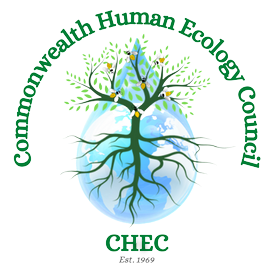Loss of two Human Ecology Stalwarts
Loss of two Human Ecology Stalwarts associated with both CHEC and Edinburgh University
Ulrich Loening (1931-2025) and Eleanor Morris (1937-2025), human ecologists associated with Edinburgh University, passed away in July and September 2025 respectively. Both made major contributions to CHEC, Ulrich supporting CHEC’s 1989 Edinburgh conference and Eleanor organising a pre-CHOGM CHEC workshop in Edinburgh in 1998 and later becoming a Governing Board member and Chairman of the Executive Committee of CHEC.
ULRICH
In 1959 Ulrich went to Scotland on an Agricultural Research Council research fellowship at the Edinburgh Botanic Gardens. Three years later, he accepted a lectureship in Botany Department Edinburgh University, transferring in 1969 to the Zoology Department to continue his molecular research on both animals and plants. In 1972, his colleague the geneticist Conrad Waddington established the School of the Man-Made Future (human ecology by another name), which the University of Edinburgh shut down after Waddington’s death in 1976. Largely through Ulrich’s efforts, it was re-established as the Centre for Human Ecology (CHE) and he became its director in 1986.
The CHE was challenging to mainstream academia, whether questioning the sustainability of industrial farming, raising the alarm on climate change or pressing the case for Scottish land reform. In 1996, after a protracted struggle, the university closed it down. A New Scientist editorial commented that “at considerable loss to the university’s intellectual tradition” it had “decided to be rid of its outspoken Centre for Human Ecology” and “a tradition of fearless inquiry will be broken.”
However, through the efforts of its former students, staff and scholarly well-wishers, the MSc course ran on. Initially this was through the Open University, then at Strathclyde University until it contracted its social sciences teaching in 2010. Today, the CHE (but no longer the MSc) is a small but independent educational unit based in Govan.
“Human Ecology” is puzzling to most people. As Ulrich wrote in an essay in Radical Human Ecology: “Most people readily appreciate what gorilla or elephant ecology is about; but not when applied to humans.”
Ulrich Loening (picture Stuart Platt)
Ulrich took part in CHEC’s series of conferences in the 1970’s and 1980’s alongside such eminent academic human ecologists as Paul Rogers (Huddersfield) and Pugh-Thomas (Salford). The Edinburgh Centre for Human Ecology played a major role in CHEC’s 1989 Edinburgh Conference in 1989, alongside the Patrick Geddes Centre in which Eleanor Morris was lecturing on Planning. He also supported the work of the Society for Human Ecology and of the European Association for Human Ecology attending many of their meetings. Ulrich was given a Lifetime Achievement Award by the Society for Human Ecology.
However, two things make Ulrich stand out from other human ecologists: his dedication to his students and his living a life in harmony with nature. The tributes on him on the Cente for Human Ecology’s website (https://www.che.ac.uk/news/in-memory-of-ulrich-loening/) bear this out, with comments such as “Ulrich created an unforgettable social and physical environment that was exceptionally full of warmth and inspiration. There are conversations that I still remember to this day” and “Human ecology conveys that the network feedbacks continue to echo beyond the life of any node, but this core link will be much missed, I hope Ulrich’s idea-list continues to grow”. He taught , researched and lived human ecology.
ELEANOR
Eleanor Morris was the local organiser of the highly successful CHEC events during the 1998 Edinburgh CHOGM. Explained how she became involved:
“Zena came straight at me! ‘You are from Edinburgh University and I need you as liaison for our next pre-CHOGM Meeting in Edinburgh 1997’. Then and there I was organised helping Zena run one of the most successful Pre-CHOGM Conferences of the Commonwealth Human Ecology Council. I was hooked and worked with her to her end”.
Eleanor was born in Washington, DC in 1935 and studied architectural science at Radcliffe (the female part of Harvard University) graduating 1956. She followed this with a Master’s degree at the University of Pennsylvania in Philadelphia, where she met husband-to-be, James S Morris, a Scottish architect, and then did further studies at the University of London. After marrying James in Philadelphia in 1959, the couple returned to Edinburgh, here she became a lecturer in planning and wrote a Ph.D. thesis on “pocket parks” in inner city areas. She became an associate member of the Royal Town Planning Institute, becoming its first female Scotland Convenor in 1986. She also was on the executive committee of the National Trust for Scotland from 1995 to 2001.
After retirement from the University, she spent much time with CHEC, being elected to the Governing Board in 1998 and spending much time in CHEC’s office helping with financial management and editing. Eleanor was always ready to attend UN meetings and to visit CHEC chapters overseas. She enjoyed being at CHOGM side events and meeting people from other Commonwealth countries.
She became the chairperson of the Executive Committee in 2008 and chaired the Finance Committee. She supported Zena in her last years at CHEC, especially in getting her to the 2009 Manchester International Human Ecology Conference where Zena was given a Lifetime Achievement Award by the Society for Human Ecology.
Eleanor Morris (centre) with Narelle Townsend (left) and Zena Daysh (right) at a UN Commission on Sustainable Development meeting in New York in 2004 (Photo Ian Douglas)
Eleanor really tried to raise CHEC’s standards and horizons. However she was not always able to understand other people’s points of view or accept their decisions. She ceased to be a Board member in 2014 and retired to “the Glass House”, the modernistic home she and her husband had built in the Midlothian countryside south of Edinburgh.
Ian Douglas and Eva Ekehorn


